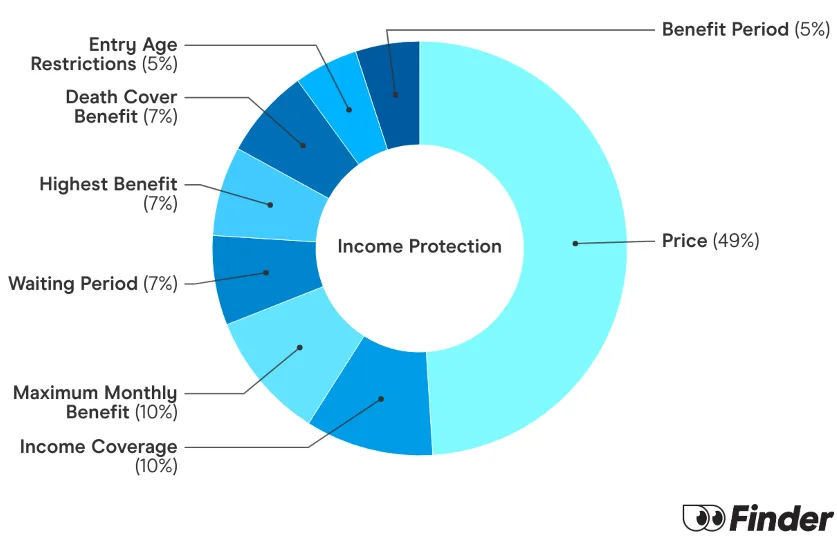Compare other products
We currently don't have that product, but here are others to consider:
How we picked theseFinder Score - Income Protection
Income Protection is a little complicated and a lot overwhelming. That's why we made the Finder Score, to make it easier to compare Life Insurance products against each other. Our experts analysed over 12 products and gave each one a score rank out of 10.
But a higher score doesn't always mean a product is better for you. Your situation is unique, so your policy choice will be too. Don't think of Finder Score as the final word, but as a good place to start your life insurance comparison.
Why couples need income protection
If your health goes downhill and you're unable to work, you can't expect to get by only on your partner's income. That's because when you're injured or become ill, there are a number of other financial burdens you have to take into consideration, including the following:
- Medical bills: Whether you've fallen and broken an ankle or are diagnosed with a serious illness that prevents you from working for a while, it's likely you'll be out of pocket for things like hospital bills and rehabilitation. Quick and effective care in Australia can be expensive. Income protection means you don't need to worry about how much treatment will cost.
- Household chores: Your partner is likely to find themselves responsible for household chores and upkeep like cooking, cleaning and grocery shopping. While it's not paid work, income protection can help pay for someone to keep on top of domestic chores. That way, it doesn't put too much pressure on your partner or slow down your recovery.
- Living expenses: Income protection ensures you can maintain your standard of living, letting you focus on your recovery rather than your outgoing expenses like food, clothing and petrol.
- Loan repayments: Are you paying off your mortgage, a car or a credit card payment? Income protection insurance ensures you and your partner can continue to do that while you're out of work.
How does income protection for couples work?
Income protection is designed to help get you back on your feet, usually covering you for 75% of your monthly income for a specific period of time (e.g. two years) if you're unable to work due to sickness or injury. It's ordinarily paid to you via monthly instalments into the bank account of your choice, just like your income. To ensure you both get access to the benefit payments, you can sometimes designate your partner as a beneficiary. Alternatively though, you can set up payment to a joint bank account.
What type of jobs you have, who is working and who is the higher earner will impact the kind of income protection you need as a couple.
- Couples with full-time salaries. If you are both working full-time jobs with salaries, it's wise to take out separate income protection policies. One policy will only pay you 75% of one person's salary.
- Couples with one earner. If your partner is a student, stay-at-home parent or taking some time off work, then you need income protection because they also depend on your salary to get by.
- Couples where only one partner is eligible. If only one of you is eligible for income protection, then the full-time salary earner should take out cover. You might not be eligible for income protection insurance if you work less than 20 hours a week, are a freelancer or are a contractor in a role for less than 12 months.
If you're worried that 75% of the main income earner's income is not enough income protection for you as a couple, there are three common ways that you can increase your cover:
- Trauma booster options. Increases your monthly income by up to 33% if you suffer a traumatic event or a critical illness.
- Total disablement benefit. Increases your monthly benefit by up to 33%, if after your waiting period (usually six months), you're still unable to work due to disability.
- Super contribution increase. Increases your benefit to 85% of your monthly income, with the additional 10% going towards your super.
Income protection for couples cost
When calculating the cost of your premiums, insurers take factors such as your age, sex and occupation into consideration. While the type of occupation you are in has a big influence on how much you will pay, how much you earn will also affect your premiums.
If you support both yourself and your partner financially, it's likely your salary is higher than average, meaning income protection will cost you more. However, on average you still won't pay as much as two people earning the same amount as one person.
Income protection for couples: Conditions and exclusions
There are a few conditions and exclusions worth keeping in mind when you apply for cover:
- Part-time workers. Most policies will not cover you if you work for 20 hours or less. It's a similar situation if you have been in the job for less than 12 months or are not on a fixed-term contract.
- Own occupation vs any occupation. Own occupation means that if you become temporarily unable to do your current job due to illness or injury, you won't have to work in any other related job. That's not the case with any occupation. With that, your insurer could claim you are able to perform other duties related to your occupation. As a result, any occupation is cheaper.
- Waiting periods. Keep in mind that you'll need to pick a waiting period when you select your level of cover. This is the period of time you have to wait before you can make a claim. It's usually between 30 to 90 days.
- Redundancy insurance. Redundancy insurance can provide short-term financial assistance if you lose your job. To be eligible, you need to meet the insurer's definition of involuntary unemployment.
What other types of insurance can couples get?
There are other insurance options for couples you might want to consider:

Life insurance
If you share an income with your partner, it's also worth considering life insurance. Unlike income protection, you can raise the amount you want to be insured for, ensuring you leave enough for your partner or family to pay off any debts. It also comes in a lump-sum payment.

Total permanent disability (TPD) insurance
If an accident occurs which forces you to permanently quit work due to disablement, TPD insurance pays you a lump sum. Similar to life insurance, you can factor in how much your partner depends on your income as well.

Trauma insurance
This comes in the form of a lump-sum payment of up to $2 million if you suffer from a critical injury such as a major head trauma. It's designed to help pay for expenses such as medical care and rehabilitation.
Sources
More guides on Finder
-
HCF Income Protect Insurance
Wondering if HCF Income Protection Insurance is right for you? We break down what’s covered, what’s not and whether it offers good value.
-
TAL Income Protection Insurance review
Learn the built-in benefits of TAL income protection to understand how it could work for you. Compare features and get a quote today.
-
Sick leave Australia: What you’re entitled to and when
Find out why income protection is an important tool to combine with your entitled sick leave.
-
Cost of income protection in Australia
Income protection costs can range from around $50 to $160+.
-
Sole trader income protection insurance
Income protection for sole traders provides financial support, via a monthly payment, if you’re unable to work due to illness or injury.
-
Income Protection Insurance vs Mortgage Protection
Does income protection provide the same thing as mortgage protection? Read on and compare.
-
Suncorp Income Protection Insurance Review
Receive income cover for illness or injury with Suncorp Income Protection.
-
Income protection insurance calculator
Find out how much your income protection insurance policy will pay out in the event of a claim. Receive quotes for income protection and apply securely.
-
NobleOak Income Protection Insurance review
NobleOak has been offering personal insurance solutions direct to Australians for over 137 years. Discover the benefits and features available on the NobleOak Income Protection policy and make a secure enquiry for cover.
-
Best income protection, Australia
Looking for the best income protection insurance but not exactly sure where to start? Compare the Finder Awards 2025 insurance winners.

